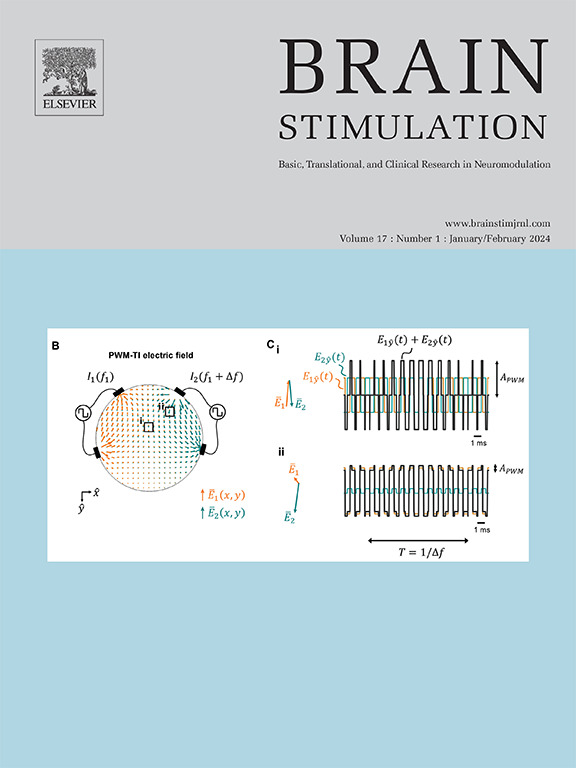经颅磁刺激的不同刺激目标可调节特定的三重网络和海马-皮层功能连接。
IF 7.6
1区 医学
Q1 CLINICAL NEUROLOGY
引用次数: 0
摘要
背景:重复经颅磁刺激(rTMS)被广泛应用于治疗阿尔茨海默病(AD)。目前,临床研究正在探索各种治疗靶点。然而,靶点的多样性会导致相当大的异质性:本研究旨在探讨不同的经颅磁刺激靶点是否能通过调节海马(HIP)和三重网络(包括显著性网络(SN)、中央执行网络(CEN)和默认模式网络(DMN))的功能连接(FC)来增强认知领域:我们招募了63名AD患者,其中48人和15人分别接受了以左侧背外侧前额叶皮层(dlPFC)和双侧角回(ANG)为靶点的经颅磁刺激治疗。我们研究了治疗前后三重网络内的网络级 FC 差异。此外,我们还利用 HIP 作为体素水平分析的种子。结果发现:以dlPFC和ANG为靶点的经颅磁刺激主要影响CEN的FC,而以ANG为靶点的经颅磁刺激主要影响SN和DMN。此外,DMN中的右颞叶与左HIP的FC在两种疗法后都有所降低。最小绝对收缩和选择算子(LASSO)分析的结果表明,海马-皮层FC在治疗效果中起着主导作用。结论:针对不同区域的经颅磁刺激会影响特定网络的功能。结论:针对不同区域的经颅磁刺激会影响特定网络的功能,两种刺激靶点都会调节海马-皮层的功能,从而影响治疗效果。根据受损网络对患者进行分类可进一步为后续治疗策略提供依据。本文章由计算机程序翻译,如有差异,请以英文原文为准。
Different stimulation targets of rTMS modulate specific triple-network and hippocampal-cortex functional connectivity
Background
Repetitive transcranial magnetic stimulation (rTMS) is widely applied to treat Alzheimer's disease (AD). Various treatment targets are currently being explored in clinical research. However, target diversity can result in considerable heterogeneity.
Objective
This study aimed to investigate whether different rTMS targets can enhance cognitive domains by modulating functional connectivity (FC) of the hippocampus (HIP) and triple network, which comprises the salience network (SN), central executive network (CEN), and default mode network (DMN).
Methods
We enrolled 63 patients with AD, of whom 48 and 15 underwent rTMS targeting the left dorsolateral prefrontal cortex (dlPFC) and the bilateral angular gyrus (ANG), respectively. We examined the network-level FC differences within the triple-network before and after treatment. Additionally, we utilized HIP as a seed for voxel-level analysis. We compared the similarities and differences in the effects of dlPFC and ANG rTMS.
Results
rTMS targeting the dlPFC primarily influenced the FC of the CEN, whereas rTMS targeting the ANG primarily influenced the SN and DMN. Moreover, the right temporal lobe within the DMN exhibited reduced FC with the left HIP following both therapies. The results of least absolute shrinkage and selection operator (LASSO) analysis indicated that hippocampal-cortex FC played a dominant role in the therapeutic effect. The observed FC changes significantly correlated with improvements in multiple cognitive scales.
Conclusion
rTMS targeting different regions affected the FC of specific networks. Both stimulation targets modulate the FC of hippocampal-cortex to influence therapeutic outcomes. Classification of patients based on damaged networks can further inform subsequent treatment strategies.
求助全文
通过发布文献求助,成功后即可免费获取论文全文。
去求助
来源期刊

Brain Stimulation
医学-临床神经学
CiteScore
13.10
自引率
9.10%
发文量
256
审稿时长
72 days
期刊介绍:
Brain Stimulation publishes on the entire field of brain stimulation, including noninvasive and invasive techniques and technologies that alter brain function through the use of electrical, magnetic, radiowave, or focally targeted pharmacologic stimulation.
Brain Stimulation aims to be the premier journal for publication of original research in the field of neuromodulation. The journal includes: a) Original articles; b) Short Communications; c) Invited and original reviews; d) Technology and methodological perspectives (reviews of new devices, description of new methods, etc.); and e) Letters to the Editor. Special issues of the journal will be considered based on scientific merit.
 求助内容:
求助内容: 应助结果提醒方式:
应助结果提醒方式:


